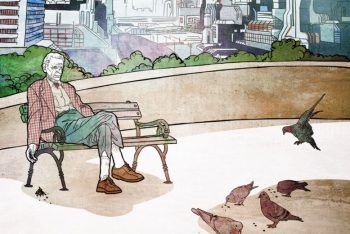Carol Tavris at the TLS:
 A review of books on ageing is inevitably filtered through the age, health and optimism quotient of the reviewer. Thirty years ago I wrote an essay for the New York Times, cheerfully titled “Old Age Is Not What It Used To Be”, full of encouraging news from the newly burgeoning field of gerontology. In those days, “old age” usually referred to people in their sixties and seventies, with some outliers in their eighties and even a few in their nineties. (Bernice Neugarten and other gerontologists had recently begun to speak of the “young old”, who are healthy and mentally competent, and the “old old”, who aren’t.) My essay was populated with thriving old people who were as witty, active, happy, sexually active and intellectually engaged as they had ever been, and by researchers assuring us that we won’t “lose it” so long as we remain witty, active, happy, sexually active and intellectually engaged. All very nice, cynics muttered, but how are we supposed to retain those satisfactions when every joint aches, we have lost a life partner and too many close friends, mental sharpness blurs, hearing declines, the grown-up children have decamped to foreign lands, the identities that provided meaning are gone, and we start to feel like a bump on the log of life?
A review of books on ageing is inevitably filtered through the age, health and optimism quotient of the reviewer. Thirty years ago I wrote an essay for the New York Times, cheerfully titled “Old Age Is Not What It Used To Be”, full of encouraging news from the newly burgeoning field of gerontology. In those days, “old age” usually referred to people in their sixties and seventies, with some outliers in their eighties and even a few in their nineties. (Bernice Neugarten and other gerontologists had recently begun to speak of the “young old”, who are healthy and mentally competent, and the “old old”, who aren’t.) My essay was populated with thriving old people who were as witty, active, happy, sexually active and intellectually engaged as they had ever been, and by researchers assuring us that we won’t “lose it” so long as we remain witty, active, happy, sexually active and intellectually engaged. All very nice, cynics muttered, but how are we supposed to retain those satisfactions when every joint aches, we have lost a life partner and too many close friends, mental sharpness blurs, hearing declines, the grown-up children have decamped to foreign lands, the identities that provided meaning are gone, and we start to feel like a bump on the log of life?
more here.
